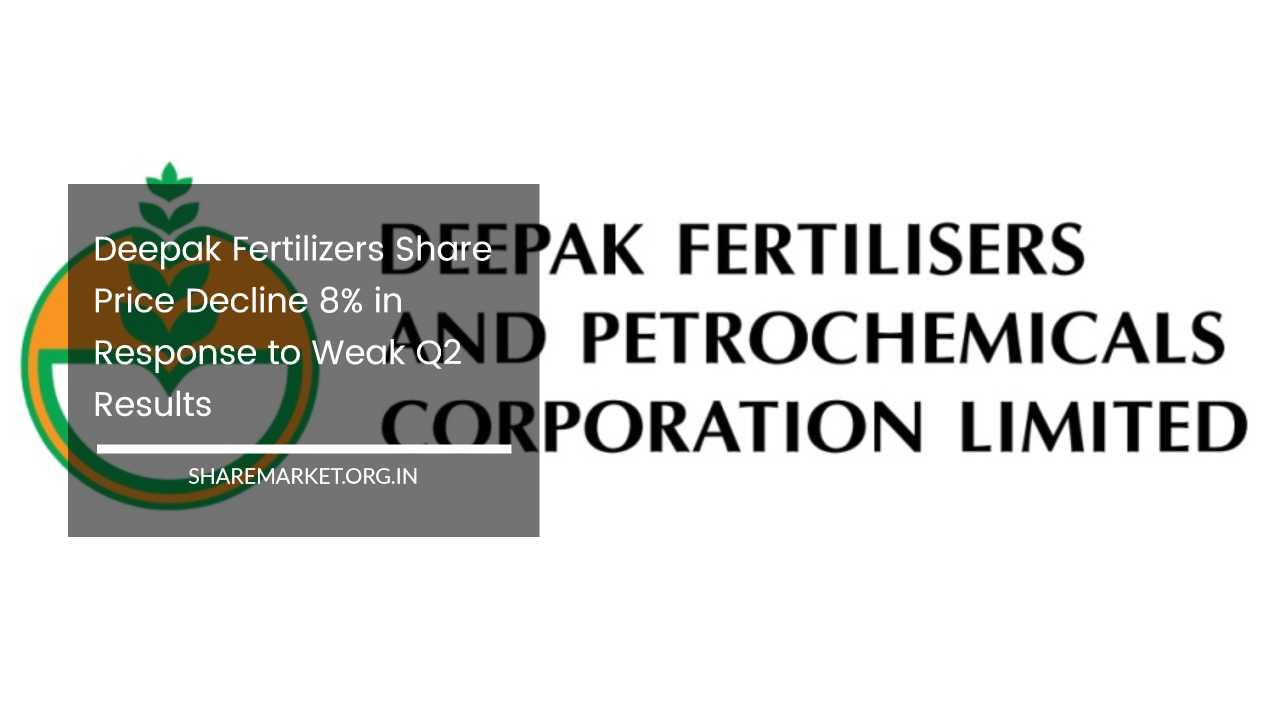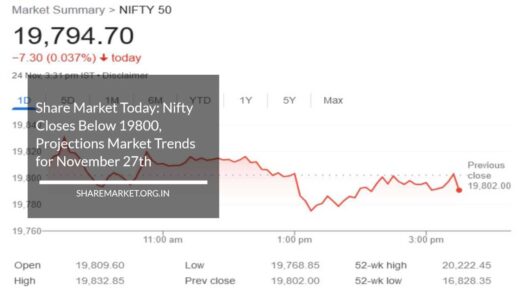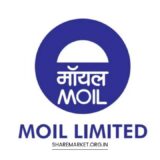Deepak Fertilizers Share Price Decline 8% in Response to Weak Q2 Results

Deepak Fertilizers Share Price
On November 2, 2023, Deepak Fertilizers and Petrochemicals Corporation, a prominent player in the agrochemical industry, faced a notable setback as its shares witnessed a sharp decline of approximately 8 percent.
This abrupt drop in stock value sent shockwaves through the financial markets, prompting investors and analysts to scrutinize the underlying reasons for this significant downturn.
It was evident that the company’s disappointing performance in the September quarter played a pivotal role in this stock price decline, but the extent of the impact, as well as the broader economic and industry-specific factors, needed deeper exploration.
The Decline in Share Price:
Deepak Fertilizers, like many other companies in the agrochemical sector, had been navigating through challenging waters for some time.
However, the sharp 8 percent decline in share price on November 2 was particularly alarming. The stock closed at Rs 595.05 after a substantial decrease of 6.76 percent during the trading session.
This immediate response by investors signified a loss of confidence in the company’s financial performance and outlook.
The Weak September Quarter Results:
One of the primary drivers behind the investor exodus on November 2 was Deepak Fertilizers’ weak financial performance in the September quarter.
The company’s net profit had plunged by a staggering 78 percent on a year-on-year basis, plummeting to Rs 60.10 crore.
This alarming decline in profitability was a glaring indicator of the company’s struggle to maintain its financial health.
Revenue Impact:
The company’s revenue, a key indicator of its overall financial performance, also took a significant hit during the September quarter.
It registered a sharp decline of almost 11 percent year-on-year, with total revenue amounting to Rs 2,424 crore.
The weakening of revenue figures could be primarily attributed to a lackluster demand for fertilizers in the market. This reduced demand had a domino effect on the company’s top-line performance.
Cost-Related Challenges:
In addition to demand-related issues, Deepak Fertilizers faced other financial challenges in the September quarter.
High-cost inventory and an increase in finance costs weighed down the company’s overall performance. These cost-related factors added further pressure to an already strained financial situation.
Operational Performance:
Apart from financial metrics, the company’s operational performance also remained under duress during the September quarter.
The EBITDA (Earnings Before Interest, Taxes, Depreciation, and Amortization) margin experienced a sharp decline, dropping to 11.8 percent from 18.2 percent in the same quarter of the previous fiscal year.
This decline in EBITDA margin indicated that the company was struggling to maintain profitability from its core operations.
Industry-Specific Challenges:
Deepak Fertilizers was not alone in its struggles. The entire agrochemical sector had been grappling with challenges arising from weak demand in both domestic and global markets.
The agrochemical industry is highly dependent on factors such as weather conditions, agricultural cycles, and government policies, making it susceptible to fluctuations in demand and pricing.
The sector had been facing a combination of these challenges, which exacerbated Deepak Fertilizers’ difficulties.
Year-to-Date Performance:
Looking at the company’s performance over the year up to that point, it was evident that Deepak Fertilizers had already experienced a significant decline of over 16 percent.
The 8 percent fall in share price on November 2 added to the cumulative challenges the company had been facing.
This year-to-date performance was reflective of the broader issues within the agrochemical sector and the specific financial hardships faced by Deepak Fertilizers.
Short-Term Performance:
Zooming in on the short-term performance, shares of Deepak Fertilizers had experienced an 8 percent decline in the month leading up to November 2.
This short-term performance indicated that investor sentiment had been progressively deteriorating, which ultimately led to the sharp decline in share price on that particular day.
Medium-Term Performance:
Over a six-month period, the stock’s performance remained relatively flat. This period of stagnation in stock value could be attributed to the company’s efforts to weather the industry-specific challenges and regain investor confidence. Despite the stability in the medium-term, Deepak Fertilizers was struggling to show significant signs of recovery.
Long-Term Performance:
Over the course of a year, Deepak Fertilizers’ stock had tumbled by a substantial 34 percent. This long-term decline illustrated the magnitude of the company’s struggles and the uphill battle it faced in regaining market trust and repositioning itself as a reliable investment.
Market Perception and Investor Sentiment:
The market’s perception of Deepak Fertilizers was undoubtedly influenced by a combination of financial performance, industry dynamics, and external factors.
The decline in the company’s share price had a negative impact on investor sentiment, further exacerbating the stock’s downward trajectory. Investors tend to react swiftly to disappointing financial results, and the September quarter results were a stark reminder of the challenges Deepak Fertilizers faced.
The Future Outlook:
The future outlook for Deepak Fertilizers appeared uncertain, given the persistent headwinds in the agrochemical industry.
While it was clear that the company needed to address its financial and operational issues, it also had to navigate the broader challenges posed by market dynamics.
These challenges included unpredictable demand, fluctuating commodity prices, and government policies affecting the agrochemical sector.
Company Strategies:
To address its financial challenges, Deepak Fertilizers needed to implement strategies that could bolster its performance and rebuild investor trust.
These strategies might include cost optimization, diversification of product offerings, and exploring new markets.
The company might also consider focusing on innovation and sustainable agricultural solutions to stay competitive in a rapidly changing industry.
External Factors:
The agrochemical industry is highly susceptible to external factors, such as weather conditions, government regulations, and global market dynamics.
Deepak Fertilizers needed to closely monitor and adapt to these external factors to minimize their impact on its operations. Government policies related to agriculture, subsidies, and trade could significantly influence the company’s future prospects.
Investor Confidence:
Rebuilding investor confidence was crucial for Deepak Fertilizers. The company needed to communicate its strategies for overcoming the current challenges and provide a clear path to recovery. Transparency and consistent communication with shareholders would be essential in regaining trust.
Competitive Landscape:
The agrochemical sector is highly competitive, with several players vying for market share. Deepak Fertilizers needed to assess its competitive position, identify areas of strength, and explore opportunities for differentiation. Innovation and product development could be key drivers in gaining a competitive edge.
Market Demand and Product Portfolio:
Understanding and adapting to market demand is crucial in the agrochemical industry. Deepak Fertilizers had to assess its product portfolio and make necessary adjustments to meet changing market requirements.
This might involve expanding into areas of higher demand or developing more specialized products to cater to specific agricultural needs.
Global Market Trends:
As the agrochemical industry is not limited to domestic markets, Deepak Fertilizers had to keep a close eye on global market trends. International trade, exchange rates, and geopolitical factors could impact the company’s export business.
Diversifying into new international markets or aligning with global trends could present growth opportunities.
Investor Expectations:
Investors often have certain expectations regarding a company’s financial performance and growth prospects.
Deepak Fertilizers needed to manage these expectations and provide a realistic outlook for its future performance. Aligning its strategies with investor expectations and consistently delivering on promises would be essential.
Government and Regulatory Impact:
Government policies and regulations can significantly affect the agrochemical industry. Deepak Fertilizers had to actively engage with relevant authorities and industry associations to stay informed about potential changes in regulations and advocate for policies that support the sector’s growth.
Environmental and Sustainability Considerations:
Sustainability is a growing concern in the agrochemical industry. Companies that prioritize environmentally friendly and sustainable practices are likely to gain favor with both consumers and investors.
Deepak Fertilizers could explore initiatives related to sustainable agriculture and environmentally responsible product offerings.
Final Remarks:
The sharp 8 percent decline in Deepak Fertilizers’ shares on November 2, 2023, was a stark reminder of the challenges faced by the company within the agrochemical sector.
The weak September quarter results, along with broader industry-specific issues, had eroded investor confidence. Rebuilding trust and improving financial and operational performance were crucial for the company’s future success.
Deepak Fertilizers needed to adapt to market dynamics, government policies, and global trends while focusing on innovation and sustainability to stay competitive in a rapidly evolving industry.
Transparency and effective communication with investors were also key to regaining trust and investor support.
The path ahead for Deepak Fertilizers would require a comprehensive and strategic approach to overcome the challenges and emerge as a resilient and competitive player in the agrochemical industry.

















